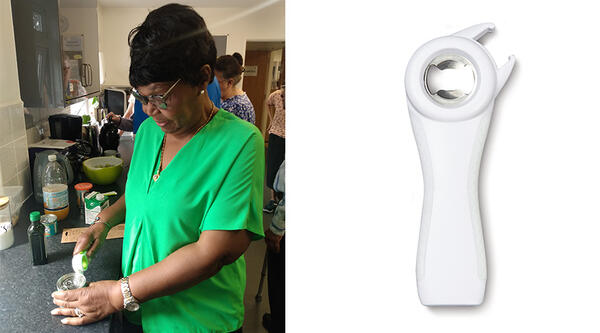Eating and drinking
People with dementia often experience problems with eating and drinking, but there are ways to help manage these.
Eating and drinking
- You are here: Eating and drinking
- Appetite and dementia
- Drinking, hydration and dementia
- Changes in eating habits and food preference
- Supporting someone with dementia to eat and drink
How dementia affects eating and drinking
The common symptoms of dementia, such as memory loss and difficulties with thinking and problem-solving. can make it more difficult to eat and drink well.
Some people may lose interest in meals and seem to have reduced appetite, which can lead to weight loss. Other people with dementia may, instead, have issues with overeating - forgetting that they’ve recently eaten or be concerned about when the next meal is coming.
As dementia progresses, the person is likely to need more support to meet their needs. Here are some of the reasons why someone with dementia might need more support:
Problems with memory and thinking
Thinking and memory problems can make it more difficult for a person to eat and drink well. A person with dementia may struggle to recognise the food and drink in front of them. Or they may be unsure how to begin eating or using cutlery. Unfamiliar food or food that looks different to how it normally does can also cause difficulties.
The person may not eat or drink for these reasons, even when they feel hungry. This can lead to weight loss and the person not getting the nutrition they need.
Meal delivery services can be helpful for people with dementia and for carers. These services, which provide prepared nutritious meals, help the person with dementia to eat well and maintain independence. And they reduce the time and energy needed to prepare or give support with meals.
Dementia and diabetes
Dementia can make diabetes more difficult to manage. Memory problems can mean people forget they have taken insulin or forget to eat. It can also make people less able to recognise that their blood sugar level is low.
Problems with coordination
People with dementia may struggle to pick up or grip items, such as cutlery or a glass. They may also have trouble putting food into their mouth. Or they may not open their mouth to take in food and may need reminding to do so.
Some people may have other conditions that affect their coordination, such as Parkinson’s disease.
Problems with coordination can lead to the person avoiding mealtimes because they are embarrassed or they want to avoid struggling.
Problems with chewing and swallowing
A person with dementia may have difficulties with chewing food. They may forget to chew or their jaw may get tired easily. Certain foods, such as hard vegetables or dry biscuits, may be more difficult for the person to chew or swallow.
As dementia progresses, swallowing difficulties (called dysphagia) become more common. They will vary from person to person, but difficulties can include the person chewing continuously or holding food in their mouth.
Swallowing difficulties can lead to weight loss, malnutrition and dehydration. If the person is drowsy or not sitting upright, they may struggle to swallow safely, which may cause them to choke.
If the person is having difficulties chewing or swallowing, talk to the GP about getting a referral to a speech and language therapist. They can diagnose swallowing difficulties and give advice. The GP can also refer you to an occupational therapist, who can advise on eating and drinking aids.
- Make sure the person is fully awake, comfortable and sitting upright before you offer food and drink.
- Avoid foods that the person has difficulty chewing. Think about ways to cook or prepare the food to make it softer.
- Good oral hygiene is important. If the person has painful gums or teeth, or has mouth ulcers, chewing will be uncomfortable and difficult. If the person wears dentures, make sure they are comfortable and fitted properly.
- Try softer foods, such as scrambled egg or stewed apple, before considering pureed food.
- If a speech and language therapist advises you to use pureed food, seek advice from a dietitian too to make sure it’s nutritious and has enough flavour.
Our online shop has products and technology that can help with eating and drinking.
Problems with eyesight
If someone has problems with their eyesight, they may not be able to see the food or the items on the table. It’s important not to assume that the person isn’t hungry if they don’t start eating.
The following measures may help:
- Make sure the person is wearing the correct glasses.
- If they aren’t able to see the food in front of them, it may help to describe the food and where it is on the plate.
- Make sure the environment is well lit.
- Choose contrasting, plain colours for the food, plate and table. For example a yellow tablecloth, a blue plate and mashed potato will be easier for the person to see. There is no particular colour that works best, but there needs to be a good contrast between the items.
- If you leave a drink out for someone, describe where it is so that they can find it. Consider a closed cup to avoid any spillages.
Taste and smell
As people get older they often begin to lose their sense of taste and smell, which can lead to food tasting less pleasant. People with dementia may begin to want more sugar, salt and spices in their food, and it’s common for them to begin eating more sweet foods.
A person with dementia may also enjoy unusual flavour combinations or ways of eating as their tastes change. Often people mix sweet and savoury food and flavours. They may start to have a less varied diet, only eating certain types of food. There are things you can do to manage this.
Judging temperature
The person may lose their ability to judge the temperature of food and drink. Be careful when giving the person hot food straight from the oven, or hot drinks that have just been made with boiling water.
Consider adding cold water to cool down hot drinks. This can help to prevent the person from burning their mouth and making further eating and drinking uncomfortable.
Constipation
Constipation is a common problem. It can result in a person feeling bloated or nauseated, making them less likely to want to eat.
Encouraging physical movement and making sure the person is drinking enough can prevent constipation. Offering the person meals that are high in fibre is also important.
If constipation becomes a problem for the person, speak to a pharmacist or the GP. We have more information on toilet problems and continence.










You may also find these ideas helpful: